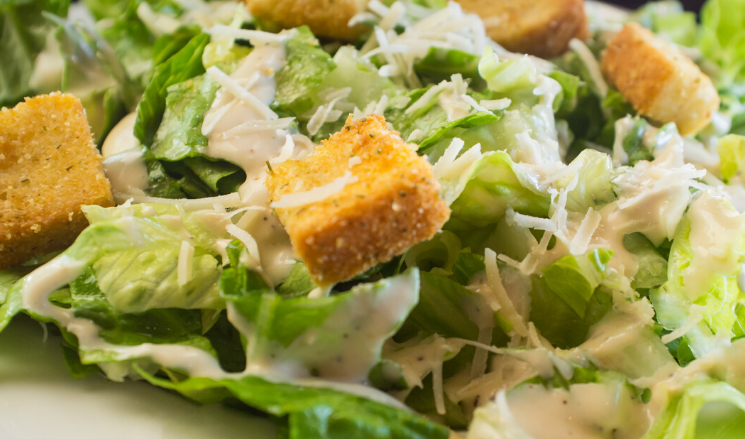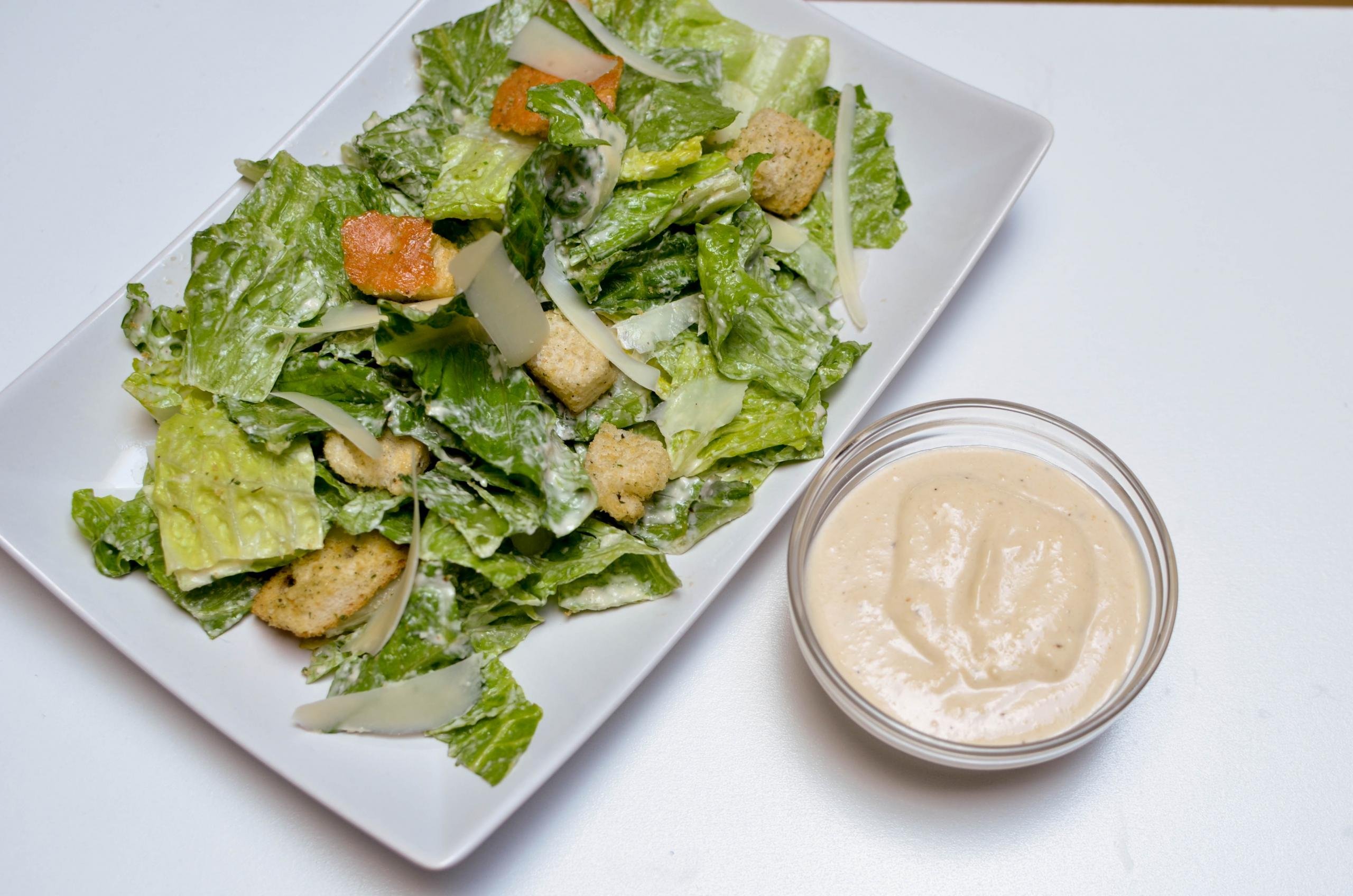Prepare to embark on a culinary adventure as we delve into the tantalizing world of Caesar salad sauce. This iconic dressing, a symphony of flavors, has captivated taste buds for generations. Join us as we explore its rich history, unravel its secrets, and guide you through the art of crafting the perfect Caesar salad sauce from scratch.
With its creamy texture, tangy zest, and umami undertones, Caesar salad sauce is a versatile condiment that elevates any salad to a gourmet delight. Whether you’re a seasoned chef or a home cook seeking to impress, this guide will equip you with the knowledge and techniques to create an unforgettable Caesar salad sauce that will leave a lasting impression.
Ingredients

Caesar salad sauce is a classic dressing made with a few simple ingredients that combine to create a creamy, flavorful, and tangy sauce.
The basic ingredients for Caesar salad sauce include:
- Mayonnaise
- Lemon juice
- Garlic
- Anchovies
- Worcestershire sauce
- Parmesan cheese
- Black pepper
Variations and Substitutions
There are many variations and substitutions that can be made to the basic Caesar salad sauce recipe. For example:
- Greek yogurt can be substituted for mayonnaise to create a lighter sauce.
- Dijon mustard can be added to the sauce for a bit of extra flavor.
- Capers can be added to the sauce for a briny flavor.
- Fresh herbs, such as basil or oregano, can be added to the sauce for a fresh flavor.
s
Making Caesar salad sauce from scratch is a simple process that yields delicious results. With a few basic ingredients and a little bit of effort, you can create a flavorful and creamy sauce that will elevate your salads to the next level.
Tips for Achieving the Best Flavor and Consistency
* Use fresh, high-quality ingredients for the best flavor.
- If you don’t have anchovies, you can substitute with Worcestershire sauce or fish sauce.
- To make a thicker sauce, add more Parmesan cheese or mayonnaise.
- To make a thinner sauce, add more lemon juice or water.
Variations
Caesar salad sauce has many variations, each with its unique flavor profile. These variations often include additional ingredients, such as anchovies, bacon, or different types of cheese, to enhance the sauce’s flavor and texture.
Here are some popular variations of Caesar salad sauce:
Anchovy Caesar
- Adds anchovies to the traditional Caesar salad sauce, giving it a briny, umami flavor.
Bacon Caesar
- Incorporates crispy bacon into the sauce, adding a smoky, savory flavor and a crunchy texture.
Parmesan Caesar
- Uses a blend of Parmesan and Romano cheeses instead of the traditional Parmesan cheese, resulting in a richer, more intense flavor.
Lemon Caesar
- Adds lemon juice and zest to the sauce, providing a bright, citrusy flavor that complements the richness of the cheese and anchovies.
Garlic Caesar
- Features roasted garlic cloves in the sauce, adding a pungent, aromatic flavor that enhances the garlic’s presence in the traditional recipe.
Serving Suggestions
Caesar salad sauce adds a rich, creamy flavor to various salads and dishes. Whether you prefer classic Caesar salad or experimenting with different flavors, this sauce can elevate any meal.
For the classic Caesar salad, simply combine the sauce with crisp romaine lettuce, freshly shaved Parmesan cheese, and crispy croutons. To enhance the presentation, consider arranging the salad in individual bowls or on a large platter, garnished with fresh herbs like basil or parsley.
Creative Presentation Ideas
- Drizzle the sauce over grilled chicken or fish for a flavorful marinade.
- Use the sauce as a dip for vegetable crudités, such as carrots, celery, or bell peppers.
- Add a dollop of the sauce to roasted potatoes or grilled vegetables for an extra layer of richness.
li>Pipe the sauce onto deviled eggs or other appetizers for a sophisticated touch.
Dishes that Pair Well with Caesar Salad Sauce
- Grilled chicken or fish
- Roasted or grilled vegetables
- Pasta dishes
- Sandwiches and wraps
- Pizza
- Appetizers, such as deviled eggs or vegetable crudités
Storage
Preserving the freshness and flavor of Caesar salad sauce is crucial for its longevity.
Understanding the proper storage techniques ensures that your homemade sauce retains its quality over time.
The ideal storage conditions for Caesar salad sauce involve refrigeration at a temperature of 40°F (4°C) or below. This temperature range inhibits the growth of bacteria and other microorganisms that can spoil the sauce.
Shelf Life
When stored properly, homemade Caesar salad sauce can maintain its freshness for a limited period. The table below Artikels the storage methods and their corresponding shelf lives:
| Storage Method | Shelf Life |
|---|---|
| Refrigerated (40°F/4°C or below) | 3-4 days |
| Frozen | Up to 2 months |
Freezing Caesar salad sauce is an effective way to extend its shelf life significantly. However, it’s important to note that freezing may alter the texture and flavor of the sauce slightly. When ready to use, thaw the frozen sauce in the refrigerator overnight or at room temperature for several hours before serving.
Last Word

As we conclude our exploration of Caesar salad sauce, let us reflect on the culinary journey we have undertaken. We have delved into the intricacies of its ingredients, mastered the art of its preparation, and discovered its endless versatility. Whether you choose to savor it with a crisp romaine salad, grilled chicken, or as a dipping sauce for your favorite appetizers, Caesar salad sauce has the power to transform any meal into a culinary masterpiece.
Common Queries
What is the secret to a flavorful Caesar salad sauce?
The key to a delectable Caesar salad sauce lies in the quality of its ingredients. Use freshly grated Parmesan cheese for a rich, nutty flavor, and opt for anchovies of the highest quality to impart a subtle umami depth. Freshly squeezed lemon juice adds a vibrant tang, while Dijon mustard provides a hint of spice and complexity.
Can I substitute Greek yogurt for mayonnaise in Caesar salad sauce?
Yes, Greek yogurt can be a healthier alternative to mayonnaise in Caesar salad sauce. It offers a similar creamy texture while providing a boost of protein and reducing the fat content. When using Greek yogurt, be sure to adjust the consistency by adding a touch of milk or water to achieve the desired thickness.
How long can I store homemade Caesar salad sauce?
Homemade Caesar salad sauce can be stored in an airtight container in the refrigerator for up to 3 days. However, it is best to consume it within 24 hours for optimal freshness and flavor.
Can I add other ingredients to enhance the flavor of Caesar salad sauce?
Absolutely! Feel free to experiment with different ingredients to create your own unique variation of Caesar salad sauce. Consider adding a touch of garlic powder, paprika, or even a drizzle of honey for a touch of sweetness. The possibilities are endless!
